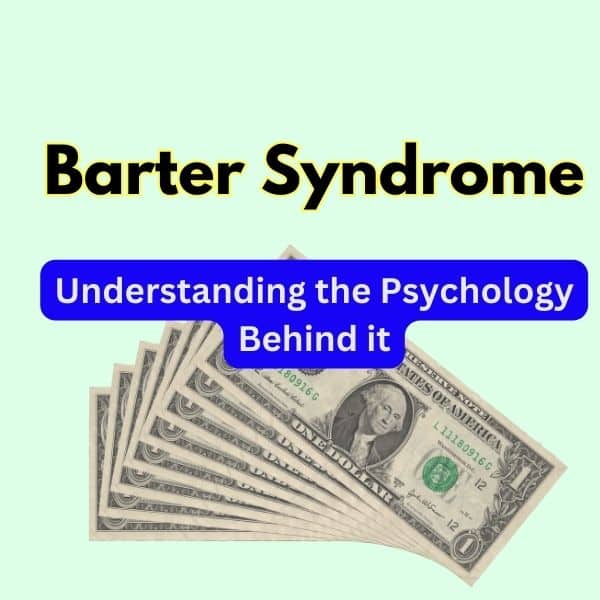The barter system has grown in popularity in recent years, particularly among small business owners and freelancers. Bartering is the practice of exchanging products or services without using money. This system has existed for centuries and is still used in many regions of the world. What is less well recognized is the psychology behind it, known as the Barter Syndrome. This post will explain the Barter Syndrome and how it impacts our behavior.
What is Barter Syndrome?
Barter Syndrome is a psychological condition where people have an overwhelming desire to exchange goods or services rather than use money. The syndrome is called after the barter system, which involves a non-monetary trade of goods and services. People suffering from Barter Syndrome find it difficult to spend money, even when it is absolutely necessary. They would rather exchange products or services with others.
Barter Syndrome is often referred to as ‘Barter Mentality‘ or ‘Barter Obsession.’ In the Diagnostic and Statistical Manual of Mental Disorders (DSM-5), the condition is not classified as a mental disorder. However, it is a problematic behavioral pattern when it affects an individual’s daily life and financial well-being.
What Causes Barter Syndrome?
Barter Syndrome has no recognized etiology. However, it is thought to be linked to a number of factors, including cultural upbringing, prior experiences, and personal beliefs. People who grew up in communities that relied heavily on the barter system, for example, may be predisposed to the syndrome.
Furthermore, some people may have had negative financial experiences, such as growing up in poverty or experiencing financial trauma, which can lead to a negative relationship with money. In certain circumstances, people with Barter Syndrome believe that money is the source of all evil or that it corrupts others.
How Does Barter Syndrome Affect Behavior?
Barter Syndrome can have a big impact on a person’s behavior, especially their financial decisions. People suffering from Barter Syndrome may avoid spending money even when it is absolutely necessary, preferring instead to trade goods or services. They may also get obsessed with acquiring products or services through bartering and devote an inordinate amount of time and effort to making deals.
Furthermore, people with Barter Syndrome may have difficulty negotiating fair deals or accurately valuing their goods or services. They may also be prone to overvaluing their own goods or services while undervaluing those of others, resulting in an unequal exchange.
How to Manage Barter Syndrome
Managing Barter Syndrome involves recognizing the symptoms and taking steps to change behavior. Some tips include:
- Recognize the problem: The first step in managing Barter Syndrome is to recognize the problem and acknowledge that it may be causing financial issues.
- Seek professional help: If Barter Syndrome is affecting daily life, it may be helpful to seek professional help from a therapist or counselor.
- Establish a budget: Setting a budget can help people with Barter Syndrome understand their spending habits and prioritize necessary expenses.
- Learn to negotiate: People with Barter Syndrome may benefit from learning negotiation skills to ensure fair deals.
- Practice mindfulness: Mindfulness practices such as meditation can help people with Barter Syndrome become more aware of their thoughts and behaviors and learn to manage them.
Coping with Barter Syndrome – Strategies for Patients and Caregivers
While living with barter syndrome can be challenging, there are various strategies patients and caregivers can employ to manage symptoms and improve quality of life.
Lifestyle Changes for Managing Symptoms
Maintaining a healthy, balanced diet and exercising regularly can help to manage some of the physical symptoms associated with barter syndromes, such as fatigue and muscle weakness. Avoiding triggers such as stress, heat, and illness can also help to prevent symptom flare-ups.
Support Groups and Networks
Joining a support group or connecting with other people who have barter syndrome can help patients and caregivers feel less isolated and provide a sense of community. Support groups can also offer practical advice and emotional support.
Caregiving Tips for Family and Friends
For family members and friends who are caring for someone with barter syndrome, it is important to educate themselves about the condition and its symptoms, communicate openly with the patient and healthcare team, and develop a support network. Caregivers should also take time for self-care to prevent burnout and maintain their own physical and mental health.
Frequently Asked Questions (FAQ)
What are the symptoms of Barter Syndrome and how is it diagnosed?
Barter Syndrome is characterized by excessive urination, dehydration, and electrolyte imbalances. Other symptoms may include fatigue, weakness, and muscle cramps. Diagnosis is usually based on a combination of symptoms, family history, and laboratory tests.
Is Barter Syndrome a curable condition?
Barter Syndrome is a rare genetic disorder with no known cure. However, there are treatments available that can help manage the symptoms and improve the quality of life.
Can Barter Syndrome be prevented?
Barter Syndrome is a genetic disorder, so it cannot be prevented. However, genetic counseling and testing may help individuals and families better understand their risk of developing this condition.
What can be done to raise awareness about Barter Syndrome?
Raising awareness of Barter Syndrome is critical to improving the lives of those impacted by this rare disorder. Individuals and organizations can help by sharing information about Barter Syndrome on social media, organizing awareness campaigns, and supporting research into this condition.
Latest Posts
- Tips for Getting Better Sleep with Anxiety in 2024

- Split Renal Test: The Best Way to Diagnose Dangerous Kidney Problems in 2024

- Revolutionizing Treatment-Resistant Schizophrenia Solutions: Unleashing Hope in 2024

- Demystifying Obsessive-Compulsive Disorder in 2024: Understanding OCD from the Inside Out

- Unmasking the Mind: Can the DAP Test Truly Decode Your Mind in 2023?

